
Today, nearly every entrepreneur is clamoring to bring their business to mobile devices. When in the market for a new mobile app, business owners might be surprised at upfront costs of app development. “It’s just an app. How much could it really cost to make?” Depending on what’s needed: a lot…or not much .

The average cost of developing an app ranges from US $80,000 to $250,000.The truth is, as software developers, we can only come up with estimates for custom web or mobile products. The final price tag will come down to things like the number and complexity of screens, platform choice (multiplatform = more effort), ongoing maintenance, and QA needs. At Topflight, we break down the cost to build an app by providing an estimate in 3 core areas:
Entire books cover these subjects. So, it may seem daunting to grasp different elements of app development costs at once. Nevertheless, we’ll attempt to break down how each of these areas affects an app estimate and hopefully demystify the process of budgeting for app development.
Let’s clear up all mystery from “How much does it cost to create an app?”
Here’s another article we wrote on how to navigate through bloated healthcare app development costs.
Top Takeaways:
Table of Contents
Many factors influence app development costs: development process, type of application, availability of reusable off-the-shelf components, developers’ experience, app complexity, etc. We’ll discuss them in-depth in a bit, but here’s a quick overview.
| Factor | Description | Price Impact |
| Discovery step | Match audience needs and business goals in the 30-40 hour discovery stage; choose development approach wisely to optimize cost and time. | $4,500 |
| Prototyping & Design | Prototyping and design, crucial for user experience and app aesthetics, involve iterative processes and include user testing. | $15,000-$30,000 |
| Coding/Development | App development, accounting for 50-70% of total costs, varies significantly based on app type, existing codebase, backend needs, and scalability. | $35,000-$75,000 |
| QA Testing | QA testing, including unit and system tests, ensures app functionality and adaptability amid technological changes. | $8,000-$18,000 |
| Deployment | Deployment, though brief, involves crucial app verification and backend transfer. | $2,000 |
| Maintenance | Cloud-based backends and third-party integrations necessitate ongoing maintenance costs. | 25 percent of total app cost per year |
| Cross-platform approach | Native apps offer power and features, while cross-platform reduces costs. | up to 40-50 percent cheaper than native |
| PWA | PWAs offer affordability and cross-platform functionality but limit hardware integration. | 30 percent of the native app cost |
| API Integrations | API integrations enable mobile apps to work with external services. | $1,000-$6,000 per integration |
| AI/ML | Machine Learning personalizes app content but increases development costs. | high impact |
| E-commerce | Ready-made e-commerce platforms offer cost-effective mobile shopping experiences. | varies |
| Geolocation | Geolocation integration varies in cost; using native SDKs is economical. | $4,000-$8,000 |
| Using phone sensors | Phone sensors enable advanced features, using APIs increases development costs. | $2,100 per sensor |
| IoT Integrations | Apps may require IoT integrations from external devices, impacting costs. | $9,000 per integration |
| Accessibility Features | Accessibility options are crucial for inclusiveness in app development. | $15,000-$25,000 |
All info here implies developing an MVP (minimum viable product) – the first releasble version of your product – and the most critical aspects that contribute to an app’s price.
Start building an application and you’ll find yourself following a predefined procedure of app creation from the 90s. Today, these app development stages are still crucial for any app development project and affect the cost to develop a mobile app.
Besides laying down the ground rules for building an application, the mobile app development process breakdown shows us how each stage affects the app cost.

During the discovery stage you match the needs of the target audience to app functionality and define business goals.
It may take 30-40 hours from the app development budget to complete such business analysis. Remember that the development approach will significantly affect your development timeline.
For example, agile development takes only a couple of days to draw up a plan for the next sprints, whereas the traditional waterfall approach consumes 10 percent of the entire app cost.
Pro Tip: If you’ve done preliminary market research (including proper research of your target audience), we recommend limiting the budget of the discovery step to 30-40 hours / $4,500. Invite business analysts familiar with your domain to sail through this step faster. Then, move on to the design stage — the next step of setting a budget for creating an app.
The next step after the discovery is to think through user experience and create graphical assets. To determine the cost to design an app, we proceed by creating a clickable prototype.
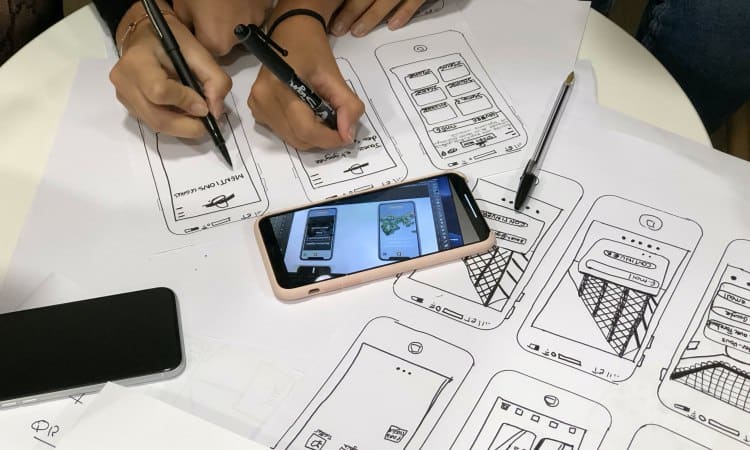
Design of an app is more than the color scheme, icons, logos, or animation for screen transitions. For the overall design of an application, we consider the aesthetics of a finished product: user interface and user experience.
Ultimately, it’s the design and development team’s job to ensure that no user is left dazzled. As with features, design choices range from simple to complex, which impacts the budget to make an app.
In a simple case, you develop an app using a lightly-customized bootstrap theme.
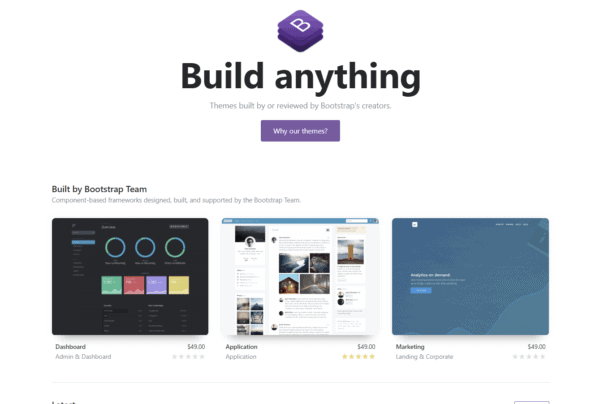
In more complex cases, the app design cost will be higher for clients: custom, built-from-scratch, multi-screen software with complex navigation, platform-specific UX behavior, and robust back-end logic. Assessing all that is critical to determining the time and money required to deliver the app project.
Imagine a feature-rich Uber app with few screens but lots of customization and compare to an enterprise app with minimal design requirements.
Each step of the design process must lead to an intuitive and slick UI to keep the user engaged. That takes a lot of back-and-forth and will affect development pricing.
Our design process starts with a schematic of how a user works with the software — a “user journey”. This is where we get a sense of the scope of the design work (takes 6-9 hours).

Next, we create wireframes for the app based on the user journey: no frills, programmer art instead of design assets. We sketch out where the buttons, fields, text, and navigation will sit.
The wireframing stage takes half the design process: 40-50 hours.
After this scaffolding work we start working on the actual design: consider the color choices, animations, fonts, and the overall style of the app – its brand image.
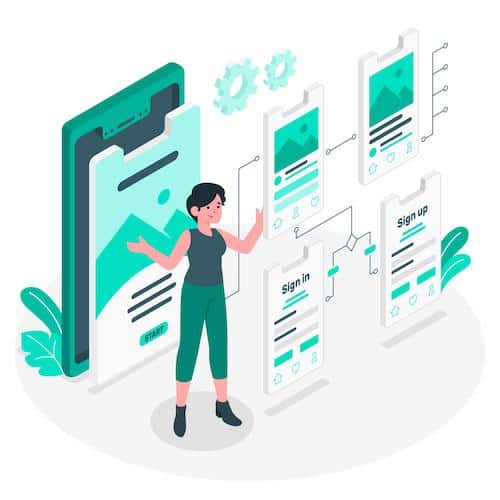
Prototyping and designing an application take the bulk of the front-end time, around 50 hours each. After the design, we’re looking at 80 to 120 hours of front-end work from start to finish (this cost estimate accounts for a first-pass attempt).
When determining the cost to create an app, founders often forget about a prototype, which should always go through a user-testing process (using a service like usabilityhub).
Usually, user testing leads to design revisions and more testing: we rinse and repeat until we get it right (changes in code are more expensive) .

Backend systems can be state-of-the-art, but users will leave if the design is a gimmick.
Pro Tip: Iterating on design is 80 percent cheaper than iterating on code; put in the extra time here to maximize ROI. The cost of the prototyping and design phase of app development takes $15,000 to $30,000.
App development per se impacts the app cost the most. Seasoned developers are still a scarce resource. That’s why coding an app accounts for 50-70 percent of the total costs of app development; and the coding times vary depending on the types of apps; from chatbot app development to building a marketplace app; or a trading and investment app, developing a cryptocurrency exchange, or creating a crypto token.
Considering these factors, it’s clear that the software application development cost is a significant investment, influenced heavily by the specific type of app being developed and the expertise required.
Whether an application is built from scratch or uses an existing codebase also affects mobile app development costs.
In the end, it all comes down to the fact that existing projects naturally bear the marks of their original creators.

Sometimes code is poorly written; simply not what our devs are used to. It’s common to hear a client saying previous developer did 80 percent of the work when the reality is 30 percent.
What’s more, because an existing project requires a billable discovery phase, it’s imperative to communicate amicably with the outgoing developers. Without documentation or knowledge of existing issues, discovery eats more of the project’s billable hours, increasing the cost to develop an iPhone app.
Whether an application is for scheduling patient appointments or babysitting hours, finding specialized recipes, tracking disease symptoms, or merely displaying a blog, it needs a database for storing product information, a payment processor for handling payments, or a CMS. In other words, unless your app offers very basic features,it must have a backend system.

The most popular SaaS backends provide off-the-shelf solutions that simplify writing parts of an application. Shopify software development kit (SDK) is a typical example: store owners can create iOS and Android apps that use the functionality typical for an ecommerce store: cart, discounts, payments, etc. Such SDKs significantly reduce the iPhone or Android app development cost.
Besides, it’s often the case when another developer has already written tools to solve 75 percent of the problems you need to solve. Open-source software like FuturePress, a javascript library to render Epub files, is, a huge boon for the cost-conscious app developer.

Of course, such packaged components drastically reduce the development time for the core of a mobile/web solution.
Simplicity can end up hamstringing app scalability. WordPress, for example, is a fantastic solution for slowly changing sites with mostly static content like blogs. On the other hand, it struggles with dynamic content like an extensive product catalog with searches and filters, serving thousands of customers.
On top of scaling issues, customization of off-the-shelf components can have an even higher overhead for developers than if they wrote it from scratch. Changing another dev’s codebase is not a trivial task.
All in all, development time (and thus average cost of app development) depends largely on the feature-set and the availability and feasibility of open-source software and SaaS platforms.

If you’re building a vanilla offline application, then chances are there are feasible pre-existing solutions, and it’ll be fairly affordable to build.
However, if your business model implies building something completely new and innovative, that’ll cost a pretty penny.
Pro Tip: coding takes 50-70 percent of all app costs. So expect to budget for $35,000-$75,000 for the coding stage of your app development.
A product riddled with bugs or an outdated application that becomes obsolete upon a new operating system release is a big no-no. This brings us to a vital, often overlooked step in the app development process: quality assurance.
QA (aka “testing”), is carried out at Topflight in a twofold manner:
Unit testing deals with each new component added to software individually. And system testing deals with overall performance and usability.

We do unit testing as we build the app, using peer-to-peer coding. System testing starts when the app’s development is complete.
Overall, QA assures both the client and us that the application functions as intended. Just remember that the Android or iPhone app development cost will depend on the number of tests. We always include regression tests to test against previously fixed issues.
Software updates, operating system upgrades, and hardware improvements mean that smartphone apps must adapt to a changing technological landscape. Therefore, the cost to build an application will always depend on required QA activities.
Pro Tip: QA usually takes around 15-20 percent of the total app price tag, in the range of $8,000-$18,000.

Fortunately, this stage takes only a fraction of time compared to other phases of making an app. That’s why it’s often overlooked in the roadmap.
At Topflight, we take care of Apple’s and/or Google’s verification process and that the back end has been transferred to a tested production environment.
Pro Tip: allow for up to $1,800 of your app-building cost for the deployment step.
Most apps have back ends on cloud service providers like AWS, Google Cloud, or Azure, which can cost pennies or thousands of dollars each month. In addition, integrated third-party services (payment systems) use a SaaS model, requiring subscription costs.
With rising popularity, the app’s throughput needs to grow, racking up app maintenance costs. Indeed, when considering ‘How much does app cost to develop?’, one must also factor in these variable maintenance costs that can significantly impact the total investment over time.
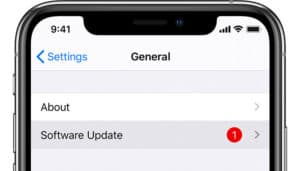
Besides, bugs are bound to crop up and need addressing continually.
Pro Tip: We typically estimate the cost for ongoing maintenance around 25 percent of the original development cost for per year.
Building an app natively, using Swift or Java for iOS and Android (also Kotlin), takes more time. In such a case, the solution consists of two codebases: for iOS and Android; plus another one for other platforms (Windows Mobile, anybody?).
That may make native sound like a non-starter, but native codebases have the potential to be more powerful and access all built-in hardware features. Big companies like Uber use the native tech stacks to craft high-quality mobile experiences.
If no GPS, NFC, or Bluetooth, then a cheaper path is open to you: A cross-platform codebase. Many great products (e.g., mobile solutions by Bloomberg or Walmart) chose that path; get in touch for more examples of apps.

Now, whether to build a cross-platform or native app is a topic far outside the scope of this blog, but one thing to mention is that in exchange for slightly restricted access to advanced hardware features , writing a React Native app tends to take between 25 and 50 percent less time than two native apps.
Cross-platform codebases have limitations, but the decision to forgo a separate native codebase for individual platforms can mean a shippable product in 4-6 months instead of 12. The average cost of mobile app development backed by cross-platform technologies like Flutter or React Native goes down, accordingly.
Choosing between Android and iOS native development, remember that the price of Android application development will be higher than the price to make an app for the iPhone: way more testing and optimizations on Android.
Ultimately, the choice between native and cross-platform approaches will significantly influence the mobile apps cost to build, making this a crucial consideration in your development journey.
Pro Tip: Cross-platform tools like React Native can trim down app development costs up to 50 percent and allow you to go to market 1.5x faster. Even if you launch on a single platform, say the iPhone, dominating the US smartphone market share, a cross-platform tech stack allows you to reach more platforms in the future.
If you want to learn more, check out our post Swift and React Native comparison.
Developing a progressive web app (PWA) is akin to cross-platform app development. Such a PWA will be available on both mobile platforms: iOS and Android. A PWA application is like website emulating a native application by its look and feel – sort of a hybrid app.
This website-app sits on your phone (with an icon, like other apps) and can be accessed even without an internet connection.

PWAs don’t support integration with phone hardware and most recent features in mobile OS versions (like push notifications or GPS).
Since PWAs are built using web technologies, they can save you budget when if you have a web application and need a mobile companion. You can repurpose the web graphical assets adjusting it to the interface of a mobile solution, and connect the UI to the existing back end.
Pro Tip: use PWA to considerably cut your development budget for developing a mobile companion app for a web application. PWA may cost around 30 percent of the native app development budget and never come close to the native iOS app development cost.
When comparing the development costs of health apps to other types of software, it’s essential to understand the unique requirements and considerations that come into play. Here are a few things to keep in mind:
Choosing the lowest quote isn’t always the best strategy, especially for health apps. Focus on quotes that allow for strategic compromises tailored to your healthcare application. This approach can help you see early results without compromising the app’s core functionality or compliance needs.
To manage costs in the initial stages of health app development, consider these tactics:
Premium quotes may be justified in scenarios where strategic compromises aren’t viable. This is often true when marketing to large healthcare systems that require full compliance and specific integrations from the outset.
By understanding these key differences and strategies, you can make more informed decisions about the development costs of health apps versus other software, ensuring that your investment aligns with your long-term goals and requirements.
The more complicated, the more expensive to develop.
A complex app includes third-party integrations, server-side logic, admin side, or the use of mobile hardware like BLE. Account for developer time and subscription costs of third-party services.
Databases, machine learning libraries, front-end frameworks, etc. Each layer of new technology adds to the project cost and depends on the type of solution – whether you’re building a marketplace app, or a stock trading and investing platform, a medical app that uses blockchain, or creating a crypto token, developing an apple watch app.
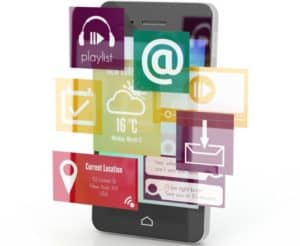
Decisions about tech and features are hard to overestimate. Create a list of all required features and mark only 2-3 options to lower the initial cost to get an app developed.
Your mobile application must work with external service providers. App coders use API calls to add payment gateways, messaging platforms, geolocation, social networks, etc.
Pro Tip: while integrating an app with on-device system features like FaceID or Apple Auth is considered a low-cost investment (under $1,000 each), making your app work with third-party services (e.g., social media) via APIs may cost $4,000-6,000 per integration.
ML and AI become mainstream. Apps rely on ML algorithms to personalize content and do so much more based on an individual user profile. However, coding ML-powered features increases the overall costs of developing an app and takes months to develop.
Pro Tip: Ask your app developers if using Core ML (iOS) and ML Kit (Android) makes sense because on-device ML can reduce the app cost.

If you want a mobile shopping experience, we advise a ready-made e-commerce platform like Shopify, BigCommerce, Magento, WooCommerce, and other SaaS platforms and white-labeled mobile e-commerce experiences.
This off-the-shelf software approach is a legit shortcut to push down the mobile app development price of a commerce app.
The cost of integrating with a geolocation service varies: it’s one thing to show a map, and quite another with routes, traffic, geofencing, etc.
Pro Tip: Use “native” mapping SDKs on each mobile platform — Apple Maps or Google maps — to keep the cost of making an app down. This approach typically raises the app making price by $4,000 or so.
Modern phones’ sensors enable advanced features:
Apple and Google provide APIs to work with this hardware. The cost to build a mobile app increases if we need to tap into the phone’s hardware (except GPS because it’s easy to access via third-party’s SDK).
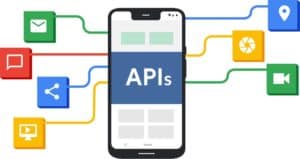
Pro Tip: the cost of developing a mobile app that works with phone sensors should be around $2,100 per sensor.
Apart from built-in sensors, apps may have to source data from external devices such as pedometers or heart rate sensors. To enable this connectivity, developers need to work with a Bluetooth Low Energy protocol (BLE).
Pro Tip: Expect the best price per external device integration to end up around $9,000 (simple, low-code scenario).
Startups need careful budgeting cost analysis to launch a new app with a cost-effective strategy because the cost involved in developing a typical app vs. custom app development costs can differ as day and night.
Unfortunately, many businesses ignore accessibility options: by not adjusting software for customers with seeing or hearing issues.
A few standards to comply with:
Typically, business owners invest in accessibility only if their product caters to a niche demo. Still, winning software titles are always implementing accessibility features. There are many ready-made web and mobile technologies and code templates for making apps more accessible to all users.
The cost of applying accessibility best practices to mobile and web development should not be overlooked.
App developers naturally affect the mobile app development cost estimate. And not just the software engineering talent. Successful apps ask for expert teams with versatile capabilities, adjusting to market conditions on the fly.
IIt’s more expensive to hire a full-stack in-house team than outsource app development to an app development agency: the cost of recruiting plus the cost of knowledge transfer — something that doesn’t influence the costs of making an app when outsourcing.
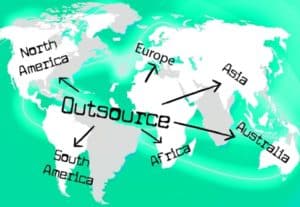
There are many other roadblocks to hiring your own team, especially if you’re interested in maintaining a decent time to market:
Depending on the scale of a project, you will need an IT management unit: someone taking care of network, security, servers, and other IT required for an optimal development process.
Developers and designers need to be coordinated; their interaction with other company units should be streamlined and transparent. So hire a CTO and project managers for that, and look out for these expenses or manage everybody by yourself.
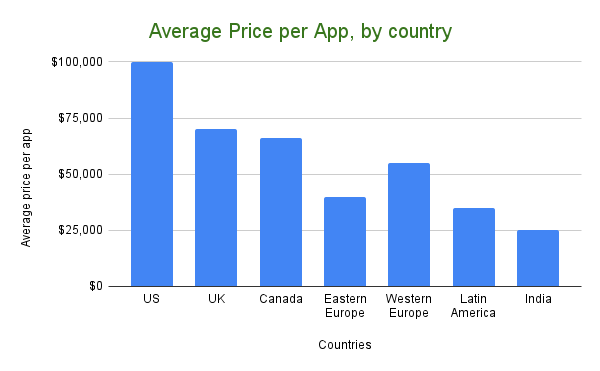
Developers quickly become hopeless without a comfy office, their computers, servers, monitors, and other high-end devices that host code.
Throughout the development process you often don’t have enough tasks to justify a full-time position, but without it, your project is not going to happen. Juggling workload between dev team members adds unnecessary complexity.
Developers operate at their best in companies that foster team spirit and promote company values.

And remember about “extra” costs associated with having your own team like 401 matching, taxes, etc.
Outsourcing a project simplifies things: your outsourcing partner will be responsible for that, while remaining accountable for the timely delivery and adherence to the agreed upon budget. However, remember to choose the right app developer wisely with the outsourcing option.
Agencies from India may offer a lower cost per hour for mobile phone app development, but lack professional developers. That skews the delivery timeframes and messes up your marketing efforts.
Therefore, if you need your product in the App Store and Google Play on time and on budget, opt for a near-shore option. Even though the median price range to create a basic app in some countries (e.g., in Eastern Europe) is about $10K, many small business owners have to rebuild their iPhone and iPad apps because they fell prey to a low hourly cost.
Eventually, their average price ended up higher, if not twice more expensive than the original low cost that got them on the hook.
Pro Tip: An average annual after-tax cost per developer in the US is around $100,000. That may be the overall cost of building your entire product, which will use more resources than a single developer and ship much sooner. The cost to have an app developed greatly depends on whether you can outsource and on the average hourly rate.
Besides design and development services, several things directly affect сosts of app development but nevertheless slip through the cracks, especially when getting a quote from a rookie. Does your app development price include these critical items?

Remember that there is more than a shiny front end: back end code with the business logic and back-end data storage. You may also need a web admin app for managing content/users.
Companies often use plug-in SaaS services to ship products faster (Chargebee for a subscription or Google Maps for location). A pro app development partner will inform you if these tools require a monthly subscription and help approximate the cost based on a customer base.
Account for the hosting costs when budgeting your app so that app’s code can run in the cloud. Get an approximate cost estimation from a few providers.
Whether you work on a software application in-house or outsource it to a mobile app development company, projet management is a must. Development companies don’t include your managerial effort in their estimate cost, but you should.
You must allocate resources to marketing (app store optimization or affiliate partnerships) before you get your product published in the app stores.
Seasoned app developers have a few tricks up their sleeve to kick down the cost to develop an app. Follow these best practices guard your app budget.
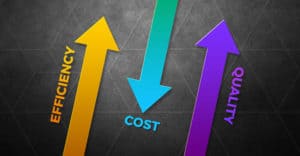
Know the target audience for your app type (ideal customer persona): their real needs, context for using the app throughout a day, etc. Is social networking their primary use case?
Verify your findings by creating a prototype of the app to keep the app cost structure under control (clickable prototype updates based on user feedback are less expensive than code changes). Otherwise, the price of building your mobile software may increase drastically.
Once you lock in the final list of app features and the app’s look and feel, it’s time to build the actual app. It is at that point that your app-making budget will start to melt quite noticeably.
To ensure that every dollar of the budget contributes to the bottom line, you need to set up a project management framework. We practice and recommend Agile with weekly sprints because it helps balance the development progress with spending.
The benefits of the agile software development approach come down to:
At any moment during development, our partners know precisely how each team member allocates their working hours, allowing to project budgets for future sprints.
No software follows specs to the letter. Programs adjust as we start releasing or testing early versions. Fortunately, agile favors flexibility, allowing the dev team to augment features, cut knickknacks, etc.: we get a product to start generating traction right after the release.
Agile’s retrospective and early adopters’ feedback imply that we get to launch faster. No need to elaborate every minute detail in requirements up front – every iteration focuses on ROI goals.
Working with an agile team is like hiring a full-stack department of cross-discipline specialists (in design, testing, development, DevOps, etc.) and not having to keep everybody on full-time payroll.
Every expert gets involved proportionally to the value they bring to the table. In addition, business owners avoid costly mistakes spending hundreds of hours on useless development.
And the budget adjusts according to your team’s velocity, depending on how many experts are allocated to your project per month and the number of hours they put into your product.

To retain the original estimated app development budget, stick to the feature set from the prototyping stage. Put off add-ons and new options until later stages of development when you can assess if you have the bandwidth.
Hopefully, you’ve got enough info now to answer, “How much does it cost to build an app?” So, the final cost won’t come as a complete surprise.
You may have come across various app development cost calculators online, promising to give you an accurate estimate of your app development costs. But, let’s face it – the intricate complexities involved in application development make these tools far from reliable.
We’ve had our fair share of experience with cost calculators. We found that only the simplest app projects adhered to their estimated budgets. Most projects deviated from the calculated costs due to market-driven pivots or the adoption of agile methodologies that allow for continuous improvement and adaptation. In essence, while calculators may provide a basic starting point, they fall short of capturing the dynamic nature of software development.
So, are you wondering how much it would cost to build your app with Topflight Apps? Well, while we always strive to deliver the best quality at a reasonable cost, it’s important to note that the complexity of your app can significantly impact the final price.
For a basic MVP, you’re looking at costs in the ballpark of $70,000 to $150,000. However, if you’re aiming for a more sophisticated solution, integrating cutting-edge components like cloud services, EHR or IoT integrations, or even ML/AI technology, the cost could rise up to $200,000 or more. We also work on prototypes for promising products that sometimes start at $40,000-50,000.
There you have it, the breakdown of app development costs. The price of your app will end up between US $80,000 and $150,000, with 25 percent of the initial app development budget going towards yearly app maintenance cost.

We’re app developers in NYC, LA, Miami, and our experienced team is here to help you. We’ll answer the most common questions about the costs of developing an app in the FAQs below, but do feel free to reach out if you have any inquiries about the cost to make an app. Our app development team will share insights to help you set up your app for success, on time, and on budget.
[This blog was originally published in July 2017. It has been updated for more recent information.]